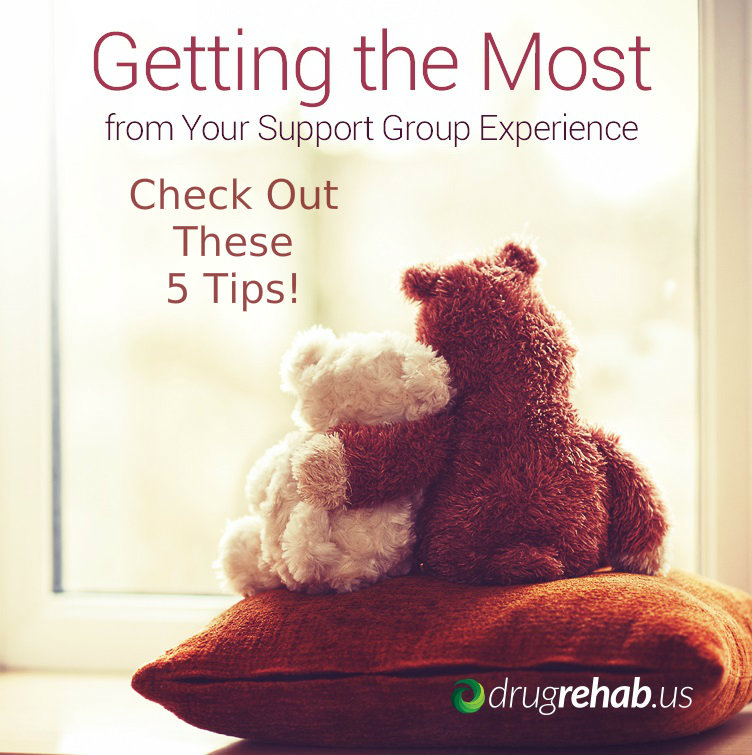Support group membership can be an important part of your recovery from addiction. Experts agree that there are several important elements to effective treatment for addiction. One of those elements must address the social needs of the addict. You can and should go through individual counseling and other types of treatment, but you also need social support. A support group is a great way to get that aspect of treatment.
Ways To Get The Most Out Of Your Support Group
When you join a support group, make sure you make the most of the experience.
1. Finding A Support Group
The first important step in having a positive support group experience is finding the right one for you. Don’t be afraid to try a few meetings with different groups to choose the one you like best. There is no rule that says you have to commit to a group after attending just one meeting. Contact community centers, religious organizations, your local library and the local newspaper to find available support groups. You can also speak to your doctor or search online for available groups.
2. Participating In A Support Group
Once you have found a group you like and in which you feel comfortable, start attending meetings regularly. You won’t get much support if you only go to meetings sporadically. You need to develop a rapport with your fellow members, get to know them and let them get to know you, even if it is anonymous. Participating is important too. It’s ok to just listen at first. You may not feel comfortable speaking up right away, but push yourself to start participating after a few meetings. You will get the most benefit from your group when you start to talk and share.
3. Be Honest And Open
An important reason for anonymity in support groups is that it helps everyone to feel better about opening up and sharing. You will get the most out of your experience if you don’t hold back. When it’s time to tell your story, be open, tell the truth and share as much about your experience as you can. Speaking out loud about what you have been through is a powerful tool for healing. The experience of being supported and comforted by those around you is restorative.
4. Work With A Sponsor
Support groups offer more than just a crowd to hear your stories and to which you can listen. They also offer the possibility of developing a meaningful relationship with a sponsor. Working with someone who has been in your position and who has more sober years than you is a wonderful tool for your own sobriety. This relationship can be long term and can be something you turn to in your times of need.
5. Get Involved
A support group is also a great way to get involved in something positive. Replacing your old, bad habits with new activities that have a positive impact on your life is an important step toward long-term sobriety. Get involved in organizing meetings and other events. Volunteer your time and talents to making the group more successful. When you’re ready, volunteer to be a sponsor and help someone else who desperately needs it.
Support groups are powerful instruments for lasting change, but only when you immerse yourself in the experience. Sporadic attendance and weak participation will only take you so far. To really get the most out of a support group you need to attend regularly, get involved, work with a sponsor and open up to your fellow members while also listening to their stories.
I Think I Feel Better … How to Know If Your Therapy Is ‘Working’
05 Aug 2014
Do 12-Step Programs Work?
The 12 Steps have long been a key element of addiction treatment and recovery. For decades, the majority of treatment programs have used the 12 Steps, while addicts in recovery have attended AA and other 12-Step meetings in order to maintain sobriety. These programs have come under a great deal of scrutiny with some people singing their praises and others discounting them and even calling them dangerous. If you are facing addiction and want to get or stay sober, should you consider joining a 12-Step support group? Do they actually work?
Criticism Of The 12 Steps
 There are many who criticize these kinds of programs, including AA, but also any organization that uses the 12-Step philosophy. Addiction experts don’t all agree, but those who do not like the 12-Step philosophy have several arguments. One is that it requires you to admit to being powerless in the face of your addiction. Some would say that the statement is not only false, but also counter-productive. If you are helpless and can’t exert power over your addiction, how can you possibly get better? Others claim that the statistics simply show 12-Step programs don’t work for most people. Success rates have been measured as low as 10 percent.
There are many who criticize these kinds of programs, including AA, but also any organization that uses the 12-Step philosophy. Addiction experts don’t all agree, but those who do not like the 12-Step philosophy have several arguments. One is that it requires you to admit to being powerless in the face of your addiction. Some would say that the statement is not only false, but also counter-productive. If you are helpless and can’t exert power over your addiction, how can you possibly get better? Others claim that the statistics simply show 12-Step programs don’t work for most people. Success rates have been measured as low as 10 percent.
More serious criticisms come from members who have had bad experiences. Some claim that these support groups are gathering grounds for people with violent tendencies or for predators looking for weak victims. There certainly have been terrible incidents involving addiction support groups. One reason for this is that criminal offenders are often forced to attend meetings as a part of sentencing.
How The 12 Steps Can Help
While there are critics, there are also supporters of 12-Step programs and those who praise the effectiveness of such groups. In fact, recent research has shown that recovering addicts who are deeply involved in a 12-Step group are more likely to avoid relapsing. The study compared recovering addicts leaving treatment and going into a sober living house, a 12-Step program, or simply going home. Those who went to a 12-Step group and really got involved in it were nearly three times more likely to abstain than those who did not. Participants in sober living were the most successful.
One of the most important aspects of the findings is the comparison between the different levels of participation in a 12-Step group. The researchers looked at those who met all criteria for active involvement as well as those who did not. The former were people who engaged in service work, made use of a sponsor, read group literature and called other group members for support. These people were more successful at abstaining than those who simply attended meetings, but didn’t get more involved. The study extended two years beyond treatment and found the same results throughout the two-year period.
The results of the study clearly show that a 12-Step program can help you stay sober if you take the right steps. First, you need to have already completed an addiction treatment program. Simply relying on a 12-Step group to get you sober is not enough. Once you have completed treatment, a 12-Step program can help you stay sober, but only if you get involved. Throw yourself headlong into the support, reach out to others, help others and you can reap the benefits of this decades-long philosophy of sobriety. Join half-heartedly and you may not get all the benefits. The 12-Steps can help you, but you have to do it right.
Find Out If Methadone Users Can Participate In A 12-Step Program
Contact Us Now For More Information On 12-Step Programs! Freedom From Addiction Is Possible!
10 Jul 2014
What, You’re An Atheist? You’ll Never Get Sober!
Atheists in AA may get the impression that they’re going to have it tough. All the talk of a higher power might be abhorrent to you, and like The Fix writer Bill Manville, you might be told that “Booze is too tough to beat all alone without the help of Jesus and His Infinite Mercy.” But is this really true? If you’re an atheist, is AA just a waste of time because it requires you to accept something you can’t fathom? Bill wondered this himself, but he attended anyway and—aside from one short relapse—has been sober for 20 years. So how did he do it? Esprit de corps, or in English: group cohesion.
Lyrics Without The Music: Drawing Parallels With Addiction Recovery
 Manville asks if you’ve ever read the lyrics to a popular song without the music pumping along to back it up. If you have, you’ll have undoubtedly noticed that without the thumping beat, the power of the words is diminished. It’s only when those lines are spoken with the incorporeal addition of the feel and strength of the music itself that they take on an almost mystical sense of meaning and importance.
Manville asks if you’ve ever read the lyrics to a popular song without the music pumping along to back it up. If you have, you’ll have undoubtedly noticed that without the thumping beat, the power of the words is diminished. It’s only when those lines are spoken with the incorporeal addition of the feel and strength of the music itself that they take on an almost mystical sense of meaning and importance.
He draws the analogy between this and addiction treatment. When you attend lectures on addiction, learn about the consequences, causes and anything you can about your problem, it’s like reading the lyrics without the music. You understand the meaning in a flat, emotionless sense (and the message that you should stop abusing drugs) but you don’t have thumping, powerful drive underpinning it all that motivates you to action. It’s missing the music.
The Therapeutic Community And AA
The rehab Manville eventually attended called itself a “therapeutic community,” with a counselor commenting that, “it’s the existential experience of going through the process with a bunch of other addicts and drunks—all of whom want to stop too—that changes the self.” Despite his initial skepticism, he found himself beginning to understand the importance of this community aspect.
He likens it to the Army, where the tough experience of basic training builds a group morale that gives the otherwise uninspired the motivation to rush into enemy territory to complete the mission at hand. The fact that you’re part of a larger group that shares your mission and has experienced the same sort of problems you have gives you that same type of motivation. You aren’t just one person being asked to tackle addiction alone. You’re part of a larger, stronger group and that in itself gives you the motivation to fight.
Getting Sober Without God
In AA, the “higher power” doesn’t have to be a deity, to the relief of any addicted atheist. Manville found his higher power in a different place: the esprit de corps and the desire to socially fit in with the new group did it for him. That was where the music came from. His theory is explained perfectly in his attitude to the Lord’s Prayer as an atheist. He writes, “When I join hands with fellow members at the end, I feel so buoyed by this merging of self into the greater whole that I find myself reciting the Lord’s Prayer aloud just like rest, and if there is indeed a God listening above, I hope my over 20 years sobriety will make Her smile.”
Becoming Empowered Without Religion
The feeling of being part of a larger group gave Manville his power to overcome addiction, but the important lesson for atheists in AA isn’t that you need to embrace the group or you won’t get sober. Embracing and connecting with the group is important for many other reasons, but the thing that spurs you on personally (the “music” for you, if you will) can be anything that works for you.
The true lesson from Manville’s story is that atheists in AA need to understand that you don’t need God to get sober, just something—anything—that takes the intellectual lessons you’ve learned and provides the underlying vigor you need to turn them into reality. Becoming part of the group is just one potential solution. You need to find the one that works for you.
Learn More About Alternative Addiction Therapies


